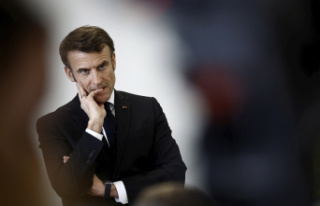How do the Japanese welcome the first visiting South Korean president after 12 long years of mutual antipathy, poison darts and sanctions? Well, with the guest's favorite dish: the very Japanese omurice, an omelette over fried rice to which a splash of ketchup is poured on top. And where better than to taste such a national delicacy, in addition to taking the opportunity to iron out rough edges, than in a hundred-year-old restaurant in the exclusive Ginza neighborhood of Tokyo.
The eternal animosity between the two great democracies of East Asia is over. A visit to the neighbor, a joint press conference and a little tortilla to confirm a thaw that is celebrated above all in the United States. If in the security tripartite formed by Washington, Tokyo and Seoul, the last two become friends, the alliance will be stronger than ever against the strongest rival that unites them, China, and the always annoying missiles of North Korean Kim Jong-un .
Yoon Suk Yeol, the president of South Korea, took a plane on Thursday to go to Tokyo and hold a historic summit with his counterpart Fumio Kishida, leaving behind the historical differences between the two neighbors. Leaders have decided it was time to heal the wounds of Japan's colonial past by dominating the Korean Peninsula from 1910 to 1945.
Yoon and Kishida have broken off a trade dispute that their countries have been dragging on for years: Japan will lift export restrictions on high-tech materials used for semiconductors and display panels, while Seoul will withdraw its complaint about those restrictions to the World Trade Organization .
"We are opening a new chapter," said the Japanese host at a pre-dinner press conference. Both have pledged to resume "roaming diplomacy," which means regular visits by the leaders to Tokyo and Seoul, as well as increased cooperation to deal with the "threat posed by North Korea" to the region.
Yoon's visit to Tokyo has been preceded by a message from the other close neighbor, North Korea, in the form of a long-range ballistic missile. Kim Jong-un's regime has fired an ICBM (intercontinental ballistic missile) that has flown more than 6,000 kilometers for 69 minutes to crash about 250 kilometers west of the Japanese island of Oshima.
It is the third launch of the North Korean regime so far this week, in an attempt to gain muscle for the new friendship between Seoul and Tokyo, and also for the military maneuvers that the US and South Korean armies are carrying out in the region these days .
Yoon and Kishida agreed to resume security talks between foreign and defense officials from both governments for the first time in five years, in response to continued North Korean rocket fire. "As seen from this morning's ballistic missile launch, the growing threat from North Korea's nuclear missile program poses a great challenge to peace and stability. Korea and Japan should cooperate closely to wisely counter the threat Yoon said.
The first step in mending damaged diplomatic relations was taken by Seoul a couple of weeks ago, when it announced it would drop its demand that Japanese companies compensate South Korean victims of forced labor during World War II. The last visit of a South Korean leader to Tokyo, former president Lee Myung-bak in 2011, was precisely to pressure his hosts into paying the women who were forced to work as sex slaves by the imperial army. Japanese. A year later, Lee defied his neighbor by visiting several disputed islets. Since then, relations have plummeted.
The plan now proposed by Seoul - that it is South Korea that compensates the victims through a public foundation financed by private sector companies - was welcomed by Tokyo, but not by the victims and the parliamentary opposition to President Yoon. , which they have accused of capitulating to Japan. They claim that it should be the companies of the neighboring country, and not a collection of money by their own Government, that directly provide them with the compensation they demand.
It was in 2018 when, due to forced labor in industries during the war, the South Korean Supreme Court upheld the demands of the victims and requested compensation from two Japanese companies. But Tokyo responded with a diplomatic tantrum, restricting some exports to Seoul. Barriers that have been raised after the meeting between the two leaders.
According to the criteria of The Trust Project












